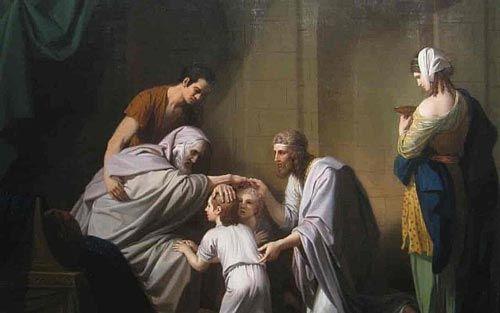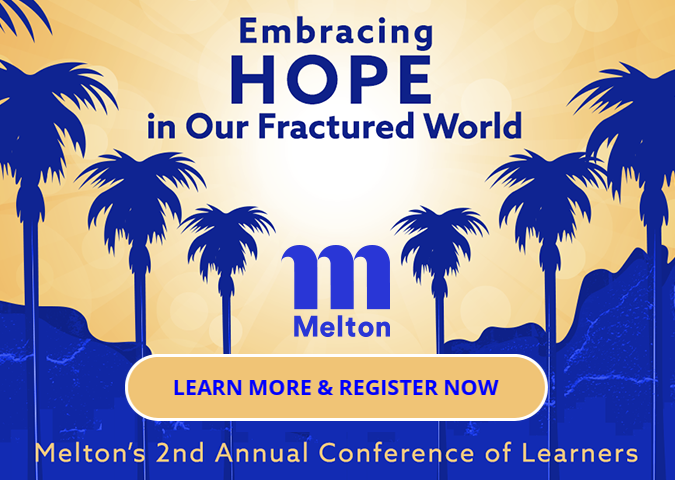Hindsight is 2020
In all matters of life and living, we can view what happens to us through one of three lenses:
Lens of insight – as life happens, we seek to understand it. Insight is the limited capacity to gain an accurate and dep understanding of something happening now.
Lens of foresight – we have the ability as human being to imagine, and foresight is the ability to accurately predict outcomes of certain decisions, choices or actions.
Lens of hindsight – after events have occurred, there is the opportunity for realization or understanding of the significance of the events as well.
In Parashat Vayechi, we listen in as Jacob, nearing his own death, speaks frankly about the past and the future. Joseph approaches his father's sickbed, bringing along his two sons, Menasseh and Ephraim, both born to him in Egypt, to receive blessings from their failing grandfather.
And Jacob said to Joseph, "God Almighty appeared to me at Luz in the land of Canaan, and He blessed me, and said to me, 'I will make you fertile and numerous, making of you a community of peoples; and I will assign this land to your offspring to come for an everlasting possession.'
Now, your two sons, who were born to you in the land of Egypt before I came to you in Egypt, shall be mine; Ephraim and Manasseh shall be mine no less than Reuben and Simeon. ….
For I, when I was returning from Paddan, Rachel died, to my sorrow, while I was journeying in the land of Canaan, still some distance short of Efrat; and I buried her there on the road to Efrat"—now Bethlehem. (Gen. 48:3-7)
Commentators wonder why, after stating that Manasseh and Ephraim will be like his own sons and receive an inheritance in the land, Jacob's mind seems to wander back to the tragic death of his beloved wife, Rachel.
What does that have to do with anything?
I suggest it is related to hindsight.
The blessing received by Jacob directly from God at Luz takes place back in Genesis Chapter 35, right before Rachel's tragic death while giving birth to Benjamin. By association, then, Jacob relates Rachel's sudden death in the midst of blessing his grandsons, because when he thinks of that incredibly moving moment, the moment when God came to him and blessed him with the distinct blessing of Abraham, the moment of spiritual elation – it was right then that disaster struck, and his dreams of finally being a whole and healthy family were shattered. In his recollection of the blessing, it was impossible for him to separate the thrilling anticipation of a life of fruitfulness and prosperity, from the pursuant shattering of those dreams with the death of his beloved Rachel. And, in hindsight, her untimely death led directly to his favoring of her sons over the others, which lead to jealousy, deception, heartache…and ultimately resulted in these – his Egyptian grandchildren.
In hindsight, for Jacob, the events were not only chronologically contemporaneous – there was a direct line of cause and effect between them, and so as he blesses his grandsons cannot mention one without bringing to mind the other. He cannot think of blessing, without recalling heartbreak.
As 2020 comes to a close, looking back on a year marked by a worldwide pandemic, my thoughts are flooded with hindsight.
- I have the feeling that online communication technology like Zoom was not brought into our world only as another modern convenience; it came into the world in the category of what our sages call להקדים רפואה למכה (providing the cure before the malady). The ensuing isolation that would was to come about in the shadow of the looming worldwide pandemic would be relieved or at least mitigated for many by pre-existing video online communication platforms. God did not invent Zoom, but I am pretty sure He had a hand in it.
- With the vaccine now rolling out worldwide, there is an outpouring of gratitude that is being expressed in prayers of thanksgiving. What I find is that the prayers being composed, by and large, bless God for having given medical researchers the insight and wisdom to develop a vaccine. In hindsight, I realize that all along, this is actually what we have been praying for – for the speedy discovery, production, and distribution of a vaccine. Looking back, it was not always this way. Over 100 years ago, in November of 1918, as the Spanish Flu was claiming the lives of thousands every day, Reverend H.T. Graham of Indianapolis beseeched his parishioners,
We are attempting to deal with an insidious plague all together scientifically through sanitation. We have failed thus far to route the foe. While forces of sanitation are perplexed, why not call the greatest of moral and religious forces, the Church of Jesus Christ, together to plead with God, the generously sovereign God, to slay the destructive foe, the flu germ.
Shall we sit still with faces masked not knowing whether the masks stop any germs coming or going, waiting for the epidemic to run its course, or shall we seek God in simultaneous prayer? He can stay the pestilence in his own wise way. It may be He will freeze it out by a cold day or night then burn It out by hot sun, then wash it away with a steady downpour of rain. Let us ask his help. (Indianapolis star, November 25th 1918)
It seems to me that we live in a generation where our prayers are less about direct Divine intervention, and more about Divine inspiration. We trust in our doctors and scientists, and we are privileged to live at a time when there is good reason to do so. For the most part, it seems to me, we envision God's role as the enabler
3. Finally, history will ponder how it was that of all countries in the world, the medically and technologically advanced United States of America performed so poorly in the face the spread of the pandemic. Many reasons may be conjectured, but one I have come across recently offers a profound insight into the human psyche. Mixed messaging from health organizations regarding the importance of wearing masks led Americans to turn to experts during times of national crisis, but the uncertainty expressed by medical experts at the beginning of the pandemic made political leaders a prominent source for guidance and clarity. For a variety of reasons, American politicians and political parties took very different sides on the subject. And because the U.S. was in the midst of a contentious presidential election year, Americans, feeling very passionately about one party or the another, remained loyal to their political preferences when it came to mask-wearing too. And even as research worldwide made it more and more clear that masks do make a difference, it was too late, and there was no turning back the clock.
There are social scientists who suggest that this intransience was related to something called identity theory. Identity theory suggests that individuals are motivated to maintain consistency between the values associated with their identity and the information they encounter. The groups we identify with provide us with a sense of belonging and self-worth. And so, once a person identifies with a political group, he or she is motivated psychologically to process information in a way that is consistent with the beliefs of the group to which he or she belongs.
In hindsight, perhaps thousands of lives could have been saved if not for the fact that the pandemic came along at the height of a very divisive U.S. national election.
Of course, hindsight is 2020 – and 2020, in hindsight, has taught me a lot.
Originally published in The Times of Israel
Images available on creativecommons.org
When you subscribe to the blog, we will send you an e-mail when there are new updates on the site so you wouldn't miss them.



